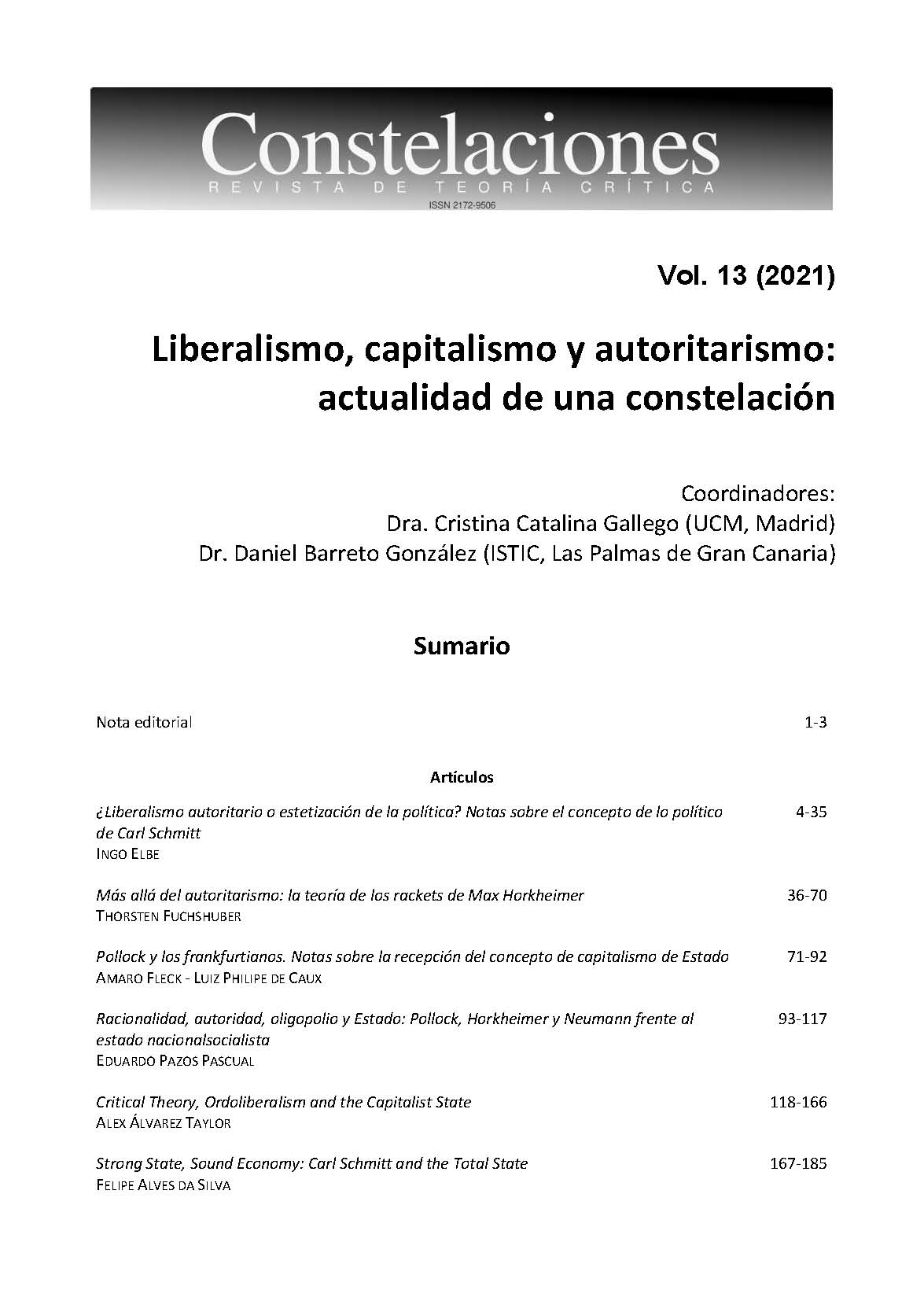Antinomies of Morality in the administered world in Theodor W. Adorno
Keywords:
Administered World, Freedom, Moral action, Materialism, PraxisAbstract
This paper proposes to analyze some central moments of Adorno's moral reflection based on his materialist conception of philosophy and his question of the possibility of praxis in the administered world. The materialistic impulse of his philosophy is aimed at the discovery of hidden mechanics in rational socialization that means the "blocking of freedom" and the progressive liquidation of the individual. The search for adequate ways of thinking and acting in the administered world to resist violence became the fundamental motive in Adorno's works.
Downloads
References
ADORNO, Theodor W. (1973): Philosophische Terminologie, Fráncfort: Suhrkamp.
ADORNO, Theodor W. (2003a): “Spätkapitalismus oder Industriegesellschaft?”, Soziologische Schriften I, Fráncfort: Suhrkamp.
ADORNO, Theodor W. (2003b): “Individuum und Organisation”, Soziologische Schriften I, Fráncfort: Suhrkamp.
ADORNO, Theodor. W. (2003c): Minima Moralia. Reflexionen aus dem beschädigten Leben, Fráncfort: Surhkamp.
ADORNO, Theodor W. (2003d): Kierkegaard. Konstruktion des Ästhetischen, Fráncfort: Suhrkamp.
ADORNO, Theodor W. (2003e): Negative Dialektik, Fráncfort: Suhrkamp.
ADORNO, Theodor W. (2006a): “Problem des neuen Menschentypus”, Current of Music. Fráncfort: Suhrkamp.
ADORNO, Theodor W. (2006b): Zur Lehre von der Geschichte und von der Freiheit, Fráncfort: Suhrkamp.
ADORNO, Theodor W. (2007): Vorlesung über Negative Dialektik, Fráncfort: Suhrkamp.
ADORNO, Theodor W. (2010): Probleme der Moralphilosophie, Fráncfort: Suhrkamp.
BERNSTEIN, Jay (2001): Adorno. Disenchantment and Ethics, Cambridge: Cambridge University Press.
BUTLER, Judith (2009): Dar cuenta de sí mismo. Violencia ética y responsabilidad, Buenos Aires: Amorrortu.
CLAUSSEN, Detlev (1988): “Nach Auschwitz. Ein Essay über die Aktualität Adornos”, en: Diner, Dan (ed.), Zivilisationsbruch. Denken nach Auschwitz, Fráncfort: Fischer.
HABERMAS, Jürgen (1993): Der philosophische Diskurs der Moderne, Fráncfort: Suhrkamp.
HERNÁNDEZ, Marcos y MARZÁN, Carlos (2021): “Los rackets como modelos de relaciones sociales”, en Hernández, Myriam y Mandujano, Miguel (eds.) Ética y política. Ensayos indisciplinados para repensar la filosofía, Granada: Comares.
HORKHEIMER, Max y ADORNO, Theodor W. (1989): “Die verwaltete Welt oder: Die Krise des Individuums”, Gesammelte Schriften, 13, Fráncfort: Fischer.
HORKHEIMER, Max (1988): “Die Juden und Europa“, Gesammelte Schriften, 4, Fráncfort: Fischer.
MARX, Karl (1976): Zur Kritik der Hegelschen Rechtsphilosophie. Einleitung, Werke, 1, Berlín: Dietz.
MENTZ, Paul (2012): Moralphilosophie im Stande der Unfreiheit. Adornos negative Moralphilosophie, Berlín: Helle Panke.
SCHILLER, Hans-Ernst (2014): “Erfassen, berechnen, beherrschen: Die verwaltete Welt”, en Ruschig, Ulrich y Schiller, Hans-Ernst (eds.) Staat und Politik bei Horkheimer und Adorno, Baden-Baden: Nomos.
SCHWEPPENHÄUSER,Gerhard (2016) Ethik nach Auschwitz. Adornos negative Moralphilosophie, Wiesbaden: Springer VS.
ZAMORA, José Antonio (2011): “Theodor W. Adorno: Crítica inmanente del capitalismo”, en: Muñoz, Jacobo (ed.), Melancolía y verdad. Invitación a la lectura de Th. W. Adorno, Madrid: Biblioteca Nueva.
Downloads
Published
How to Cite
Issue
Section
License
Copyright (c) 2021 Chaxiraxi Escuela Cruz

This work is licensed under a Creative Commons Attribution-NonCommercial-ShareAlike 4.0 International License.
Authors who have publications with this journal accept the following terms:
1. Authors will retain their copyright and grant the journal the right of first publication of their work, which will be simultaneously subject to the License of recognition of Creative Commons CC BY-NC-SA 4.0 that allows third parties to share, redistribute and adapt the work provided it is for non-commercial purposes and its author and first publication in this journal is indicated.
2. Authors may adopt other non-exclusive distribution license agreements for the version of the published work (e.g., depositing it in an institutional electronic archive or publishing it in a monographic volume) provided that the initial publication in this journal is indicated.
3. Authors are permitted and encouraged to disseminate their work via the Internet (e.g., in institutional telematic archives or on their website) before and during the submission process, which can produce interesting exchanges and increase citations of the published work. (See The Effect of Open Access).
Data confidentiality
1. Constelaciones. Revista de Teoría Crítica guarantees that the data you send us will only be used to meet the requests made in this message.
2. Your data will not be passed on to third parties.
3. You may request that your data be removed from our records at any time.





